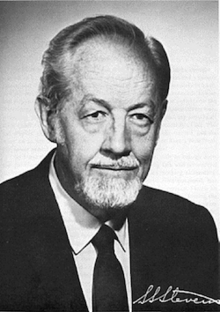
Back ستانلي سميث ستيفنز Arabic Stanley Smith Stevens German Stanley Smith Stevens Spanish استنلی اسمیت استیونز Persian Stanley Smith Stevens Finnish Stanley Smith Stevens French Stanley Smith Stevens Italian 스탠리 스미스 스티븐스 Korean Stanley Smith Stevens Polish Stanley Smith Stevens Portuguese

Stanley Smith Stevens (November 4, 1906 – January 18, 1973)[1] was an American psychologist who founded Harvard's Psycho-Acoustic Laboratory, studying psychoacoustics,[2] and he is credited with the introduction of Stevens's power law. Stevens authored a milestone textbook, the 1400+ page Handbook of Experimental Psychology (1951). He was also one of the founding organizers of the Psychonomic Society. In 1946 he introduced a theory of levels of measurement widely used by scientists but whose use in some areas of statistics has been criticized.[3] In addition, Stevens played a key role in the development of the use of operational definitions in psychology.[4]
A Review of General Psychology survey, published in 2002, ranked Stevens as the 52nd most cited psychologist of the 20th century.[5] He was a member of the American Academy of Arts and Sciences,[6] the United States National Academy of Sciences,[7] and the American Philosophical Society.[8]
- ^ Miller, George A. (1975). Biographical Memoirs. Vol. 47. Washington, D.C.: The National Academies Press. p. 524. ISBN 978-0-309-02245-3.
- ^ "Obituary: S. Smith Stevens". Physics Today. 26 (5): 81. May 1973. doi:10.1063/1.3128068.
- ^ Velleman, Paul F.; Wilkinson, Leland (1993). "Nominal, ordinal, interval, and ratio typologies are misleading". The American Statistician. 47 (1): 65–72. JSTOR 2684788.
- ^ Cite error: The named reference
Nicholsonwas invoked but never defined (see the help page). - ^ Haggbloom, Steven J.; Warnick, Renee; Warnick, Jason E.; Jones, Vinessa K.; Yarbrough, Gary L.; Russell, Tenea M.; Borecky, Chris M.; McGahhey, Reagan; Powell III, John L.; Beavers, Jamie; Monte, Emmanuelle (2002). "The 100 most eminent psychologists of the 20th century". Review of General Psychology. 6 (2): 139–152. CiteSeerX 10.1.1.586.1913. doi:10.1037/1089-2680.6.2.139. S2CID 145668721.
- ^ "Stanley Smith Stevens". American Academy of Arts & Sciences. Retrieved December 16, 2022.
- ^ "Stanley S. Stevens". www.nasonline.org. Retrieved December 16, 2022.
- ^ "APS Member History". search.amphilsoc.org. Retrieved December 16, 2022.
© MMXXIII Rich X Search. We shall prevail. All rights reserved. Rich X Search